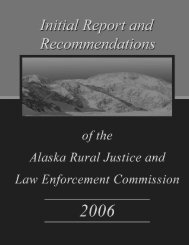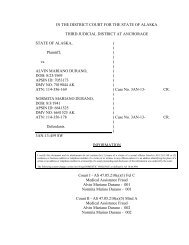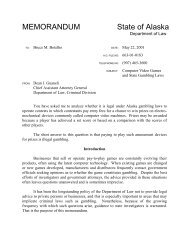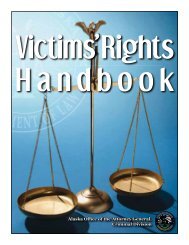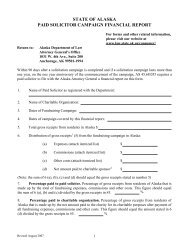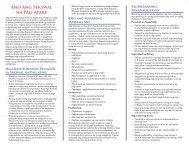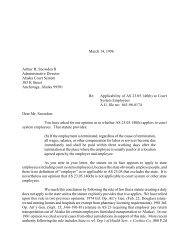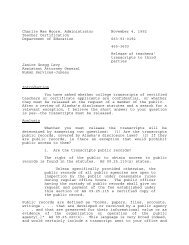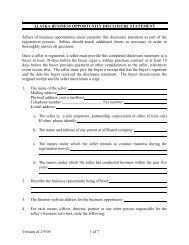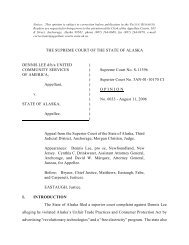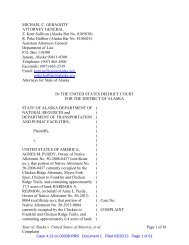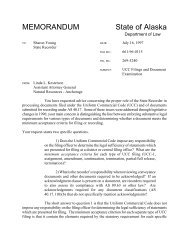Meaning of incarceration - Alaska Department of Law
Meaning of incarceration - Alaska Department of Law
Meaning of incarceration - Alaska Department of Law
Create successful ePaper yourself
Turn your PDF publications into a flip-book with our unique Google optimized e-Paper software.
Honorable Darrel Rexwinkel September 22, 1993<br />
Commissioner, Dept. <strong>of</strong> Rev. Page 4<br />
663-94-0115<br />
been interpreted to include time spent in a mental<br />
hospital, a juvenile detention center, a<br />
diagnostic center, a hospital, a halfway house,<br />
and a hotel room.<br />
Lock v. State, 609 P.2d 539, 543-44 (<strong>Alaska</strong> 1980) (footnotes<br />
omitted). See also Nygren v. State, 658 P.2d 141, 146 (<strong>Alaska</strong><br />
App. 1983), in which the determinant is whether "'substantial<br />
restrictions on one's freedom <strong>of</strong> movement and behavior' have been<br />
imposed, so as to require credit for time served under Lock"<br />
(emphasis added).<br />
By contrast, a person in third-party custody, however,<br />
is not in such a custodial setting as to warrant credit for such<br />
time against his sentence. Ackermann v. State, 716 P.2d 5 (<strong>Alaska</strong><br />
App. 1986). 4 Probation and <strong>incarceration</strong> are, under ordinary circumstances,<br />
mutually exclusive. See, e.g., State v. Jackson, 776<br />
P.2d 320 (<strong>Alaska</strong> App. 1989) (making the distinction between a<br />
probationary sentence and <strong>incarceration</strong> for purposes <strong>of</strong> propriety<br />
<strong>of</strong> sentence). Parole and <strong>incarceration</strong> are not the same, even<br />
though the parolee must report frequently to an <strong>of</strong>ficer charged<br />
with his or her supervision. See, e.g., Jackson v. State, 616<br />
P.2d 23 (<strong>Alaska</strong> 1980); Walters v. State, 798 P.2d 357 (<strong>Alaska</strong> App.<br />
1990).<br />
Other case law provides some additional insights in<br />
harmony with those above. A situation in which a person is under<br />
"community confinement" or home detention, i.e., not within an<br />
institution, but whose movement is restricted, has been found to<br />
be "imprisoned," and, therefore, incarcerated. United States v.<br />
Strozier, 940 F.2d 985, 988 (6th Cir. 1991). This is in concert<br />
with the "Community Custody" status described by 22 AAC<br />
05.271(b)(1). However, a person given a suspended imposition <strong>of</strong><br />
sentence and period <strong>of</strong> probation was found not to be under<br />
conditions <strong>of</strong> <strong>incarceration</strong> in Petition <strong>of</strong> Sewell, 474 P.2d 146,<br />
147 (Mont. 1970).<br />
Thus, the common determinant in <strong>Alaska</strong> case law is<br />
exemplified by the Lock and Nygren holdings above. That is, if<br />
the individual is subjected to such restriction and limitation<br />
that he or she would be entitled to credit for time served while<br />
in that condition, he or she is incarcerated. This comports with<br />
4<br />
"We are satisfied that a person in third-party custody who<br />
has the freedom to move about the community, limited only by his<br />
custodian's accompaniment, and one who is confined to a fishing<br />
boat while it is at sea is not entitled to credit for time spent<br />
on pretrial release." 716 P.2d at 6 (emphasis added).



